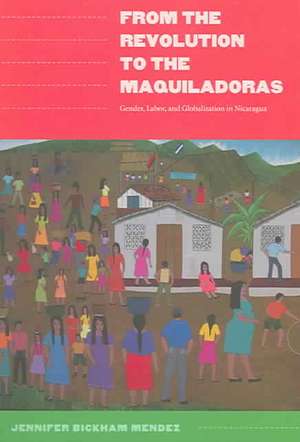From the Revolution to the Maquiladoras – Gender, Labor, and Globalization in Nicaragua: American Encounters/Global Interactions
Autor Jennifer Bickham Mendezen Limba Engleză Paperback – 6 sep 2005
Din seria American Encounters/Global Interactions
-
 Preț: 154.43 lei
Preț: 154.43 lei -
 Preț: 239.64 lei
Preț: 239.64 lei -
 Preț: 194.09 lei
Preț: 194.09 lei -
 Preț: 270.04 lei
Preț: 270.04 lei -
 Preț: 230.15 lei
Preț: 230.15 lei -
 Preț: 308.90 lei
Preț: 308.90 lei -
 Preț: 306.22 lei
Preț: 306.22 lei -
 Preț: 311.22 lei
Preț: 311.22 lei -
 Preț: 212.30 lei
Preț: 212.30 lei -
 Preț: 302.19 lei
Preț: 302.19 lei -
 Preț: 266.18 lei
Preț: 266.18 lei -
 Preț: 266.18 lei
Preț: 266.18 lei -
 Preț: 263.29 lei
Preț: 263.29 lei -
 Preț: 262.32 lei
Preț: 262.32 lei -
 Preț: 211.88 lei
Preț: 211.88 lei -
 Preț: 301.59 lei
Preț: 301.59 lei -
 Preț: 306.00 lei
Preț: 306.00 lei -
 Preț: 302.74 lei
Preț: 302.74 lei -
 Preț: 241.03 lei
Preț: 241.03 lei -
 Preț: 305.46 lei
Preț: 305.46 lei -
 Preț: 303.11 lei
Preț: 303.11 lei -
 Preț: 309.71 lei
Preț: 309.71 lei -
 Preț: 201.81 lei
Preț: 201.81 lei -
 Preț: 213.83 lei
Preț: 213.83 lei -
 Preț: 300.24 lei
Preț: 300.24 lei -
 Preț: 306.38 lei
Preț: 306.38 lei -
 Preț: 313.51 lei
Preț: 313.51 lei -
 Preț: 332.75 lei
Preț: 332.75 lei -
 Preț: 301.59 lei
Preț: 301.59 lei -
 Preț: 241.03 lei
Preț: 241.03 lei -
 Preț: 269.06 lei
Preț: 269.06 lei -
 Preț: 215.19 lei
Preț: 215.19 lei -
 Preț: 305.08 lei
Preț: 305.08 lei -
 Preț: 304.31 lei
Preț: 304.31 lei -
 Preț: 301.00 lei
Preț: 301.00 lei -
 Preț: 238.01 lei
Preț: 238.01 lei -
 Preț: 261.18 lei
Preț: 261.18 lei -
 Preț: 261.18 lei
Preț: 261.18 lei -
 Preț: 299.68 lei
Preț: 299.68 lei -
 Preț: 303.50 lei
Preț: 303.50 lei
Preț: 262.52 lei
Nou
Puncte Express: 394
Preț estimativ în valută:
50.25€ • 54.60$ • 42.24£
50.25€ • 54.60$ • 42.24£
Carte tipărită la comandă
Livrare economică 21 aprilie-05 mai
Preluare comenzi: 021 569.72.76
Specificații
ISBN-13: 9780822335658
ISBN-10: 0822335654
Pagini: 304
Ilustrații: 14 b&w photographs, 1 map
Dimensiuni: 153 x 224 x 22 mm
Greutate: 0.41 kg
Editura: MD – Duke University Press
Seria American Encounters/Global Interactions
ISBN-10: 0822335654
Pagini: 304
Ilustrații: 14 b&w photographs, 1 map
Dimensiuni: 153 x 224 x 22 mm
Greutate: 0.41 kg
Editura: MD – Duke University Press
Seria American Encounters/Global Interactions
Recenzii
This is a compelling case study of a womens NGO organizing women workers in a Free Trade Zone in post-Sandinista Nicaragua. Jennifer Bickham Mendezs account reveals the challenges faced by a feisty NGO trying to survive and maintain its autonomyfrom capital, the state, and the good intentions of international donors. It is a testimony to the strengths, but also the fragility, of civil society in todays struggling democracies.Jane S. Jaquette, coeditor of Women and Democracy: Latin America and Central and Eastern Europe[A] must-read text for anyone interested in contemporary womens movements, labor organizing, and issues of transnationalism and globalization in Latin America and elsewhere.Lynn Stephen, American Ethnologist
Notă biografică
Textul de pe ultima copertă
"This is a compelling case study of a women's NGO organizing women workers in a Free Trade Zone in post-Sandinista Nicaragua. Jennifer Bickham Mendez's account reveals the challenges faced by a feisty NGO trying to survive and maintain its autonomy--from capital, the state, and the good intentions of international donors. It is a testimony to the strengths, but also the fragility, of civil society in today's struggling democracies."--Jane S. Jaquette, coeditor of "Women and Democracy: Latin America and Central and Eastern Europe"
Cuprins
Descriere
How grassroots organizations tap into global networks and how gender plays into transnational political practices, addressing these issues through extended ethnographic research











